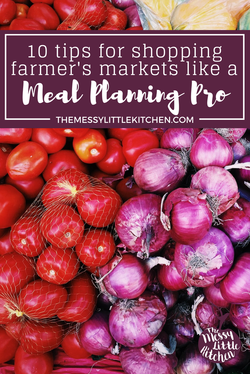 1) Be familiar with what produce is in season. If something is currently “in season’, it should be more readily available and won’t be imported (including additional transportation fees), meaning you can likely get locally grown food at better prices. Not only will you get fresh options that are more locally grown, but this is more budget friendly as well! Find out more about what's in-season during each month here. 2) Make a general meal plan before you go to the market. You meal plan can incorporate the seasonal produce that you anticipate purchasing, or you can create a meal plan that allows flexibility based on the produce and foods you will find (e.g. a quiche or pizza could have ingredients substituted based on what’s available from vendors). Also, by having an idea of what meals you are shopping for, this will allow you to stay focused as opposed to feeling overwhelmed. As part of this plan, keep it simple! Some of the best sides are just fresh produce enhanced with a flavour from your pantry (oil, vinegar, seasonings, etc.) SAMPLE SPRING & SUMMER MEAL PLAN IDEAS (2 WEEK ROTATION) Monday a. Quiche and Salad b. Macaroni & Cheese with Salad Tuesday a. Slow Cooker Roast Beef with Quinoa and Cucumber Salad b. Slow Cooker Roasted Chicken with Brown Rice and Ceasar Salad Wednesday a. Mexican Shredded Beef Salad (using leftover beef) b. Cobb Salad with Blue Cheese Dressing (using leftover chicken) Thursday a. BBQ’d Beef Kofta Burgers (from the freezer) with Rice & Grilled Peppers & Zucchini b. BBQ’d Chicken Burgers (from the freezer) with Corn on the Cob & Garden Salad Friday a. Pasta Toss with Sausage/Chicken, Tomato Sauce and Chopped Chard, Peppers, & Sautéed Mushrooms b. Tortellini Pasta Salad with Peppers, Cucumber, Tomatoes & Feta with Greek Dressing 3) Check out what ingredients you already have at home. This can include looking at what foods you have in your freezer that need used up, your pantry, or even a quick peek to see what’s ready for harvesting in your garden (if you have one). 4) Limit your shopping bags!Only bring the number of fabric grocery bags you will need for your pre-planned market purchases. This will serve as a good reminder to not splurge, and it will reduce waste by requiring plastic bags from the market vendors. 5) Don’t over buy too many fresh ingredients & stick to your plan! It’s easy to get excited and overwhelmed by all of the amazing food in front of you, and then end up buying too much! But food waste doesn’t help you, the planet or your pocket book. Keep in mind a handful of things that you actually need for the upcoming week, and having a meal plan will really help to narrow that down so it doesn’t become a case of your eyes being bigger than your stomach. 6) Buy at least a couple of fresh food items you are able to freeze. Doing this helps in the event that you do overindulge, or if other events come up during the week that throws your meal plan off track. It never hurts to have produce that is a bit more flexible. You might be surprised at the number of veggies and fruits that are freezable for everything from awesome stir-fries at a later date, to smoothies in the morning. This Freezing Vegetables resource is invaluable, as are these tips on how to Freeze Fresh Summer Fruit. 7) Shop around! Get to know the farmers, find out where and how things were grown, and ask them about their produce. At my local market there about really only 2-3 vendors I’ve started to focus on based on the quality of the produce, and because I know for certain that I’m supporting a local business (not a vendor with imported food). I can attest that my local farm’s heads of lettuce always stay fresh longer because they were picked just before coming to the market! 8) Involve your kids.Ask your family to look around and try something new. This helps to engage kids in finding flavours they will enjoy and be excited about in your meal plan. They may also be excited about buying a few plants for the garden and planting and caring for these throughout the season. Kids who are involved in growing and making their own food are more likely to eat it! 9) Shop earlier for selection, or shop later for deals.As a mom, I’m always cognizant of the ever-important nap-time window. Shopping earlier during the market hours will ensure you have prime choice of whatever vendors are selling that week. But, if it’s at all possible you may want to consider shopping closer to closing time at your market. Vendors don't want to take food time and have to store it, as it may spoil. They will offer discounts closer to closing time to ensure nothing comes home with them. 10) Plan for an end-of-the-week food clean up! At the end of the week, set a reminder on your phone or calendar to do a fridge clean up! That may mean freezing some unused produce for the near future, having an omelette, stir fry night or leftovers night (with pre-cooked food). Get creative with your leftovers, and don’t let them go to waste before your next trip to the market! How often do you go to the farmer's market? What are your favourite ingredients to buy and meal plan with? Leave a comment below!
1 Comment
Mary Carver
6/22/2017 09:28:36 am
Bravo Heather! Great time saving resource for busy families here. Leave it to a PHEc to help families and individuals deal with the time challenges of every day life!
Reply
Your comment will be posted after it is approved.
Leave a Reply. |
The Ontario Home Economics Association, a self-regulating body of professional Home Economists, promotes high professional standards among its members so that they may assist families and individuals to achieve and maintain a desirable quality of life. Categories
All
Archives
April 2024
|
|
Subscribe to our mailing list
|
|
Unsubscribe from our mailing list
|
Copyright © 2023 Ontario Home Economics Association (OHEA). All Rights Reserved.


 RSS Feed
RSS Feed